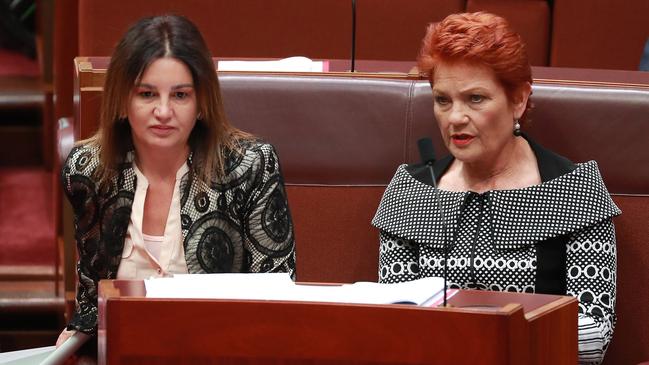Union bill defeat highlights the problem of the senate
The dysfunction between the lower and upper houses in parliament reared its head again this week and raised questions about what to do going forward, writes Peta Credlin.
Rendezview
Don't miss out on the headlines from Rendezview. Followed categories will be added to My News.
Often, we’re quick to blame the politician when things aren’t working as well as we think they should and fair enough, quite a few of them could lift their game, and then some.
But the system deserves scrutiny indeed if you want to know why government is so hard in this country, the Senate is not a bad place to start. The defeat this week of the union governance bill, designed to ensure that bullies like John Setka are kept out, has again highlighted the problem of the Senate; and how hard it is for any centre-right government to make its policies happen.
People often forget that, while the government is formed by a majority in the House of Representatives, to get any legislation through the parliament it needs a majority in the Senate too. Only once – since the Senate was expanded back in 1984 – has the government-of-the-day (left or right) had a majority-in-its-own-right in the upper house. That was back in 2004, after the Coalition won a rare haul of four senate seats, out of six, in Queensland. Apart from those three years, over the past 35 years, to get anything through the parliament, the government of the day has had to cobble together a Senate majority bill-after-bill, issue-after-issue.
RELATED: Labor accuses coalition of union bill gag
Now that hasn’t proven too hard for the Labor Party. Governments of the centre-left can invariably find people on the cross benches to support more spending, more regulating and more taxes on the so-called rich.

But governments of the centre-right can count on no such crossbench support for less regulating, lower spending, and cutting taxes for those who work hard and aspire to get ahead.
The 2014 Budget, the last budget seeking serious structural reform, was sabotaged in the Senate. Look at the difficulty this government has had re-establishing a tough watch dog over the construction industry. Even though this policy had featured in every election campaign since 2010, and the 2016 double dissolution, only some time through the last term would the cross bench finally relent and pass this law.
RELATED: Labor continues fight against unions bill
This is why the current government often seems to be in office but not in power – because getting anything through the Senate (once Labor has pledged to vote against it) requires hoovering up cross bench votes – and invariably, there’s a price to be paid to appease the Pauline Hansons, the Jacqui Lambies, and the Centre Alliance types without whom the government can’t get a single law passed. Mathias Cormann, the government’s senate leader and chief negotiator, must often think that he’s wrestling with a column of smoke.
As it happened, last week, the Morrison government had accepted a whole series of One Nation amendments to the union governance bill – and had put them up-in-lights as the One Nation amendments – yet still Hanson reneged, and voted with Labor to reject the bill. Jacqui Lambie says she’s prepared to vote to repeal Labor’s medevac laws with just one amendment – but she apparently won’t tell the government what that is!

Now, in the old days, when each state had ten senators and five were up for election each time, a quota was just over 16 per cent of the vote, and with roughly 48-per-cent-of-the-vote, a party could get a majority of the senators up-for-grabs in any one state. Since 1984, and the expansion of the parliament, with six senators, now, up-for-grabs at a normal half Senate election, a party has had to get roughly 56-per-cent-of-the-vote to score four senators, or a majority in any state – and that’s so hard that it’s hardly ever happened.
RELATED: Government response to union bill fail ‘stupid’, says Jason Clare
There is a way forward although it wouldn’t be popular because, at first glance, no one wants even more MPs and to get it up anyway, minor parties and crossbenchers would have to vote for it but as far as I’m concerned it’s about the only way the Senate gets back to a more constructive purpose of improving the law from the lower house, rather than just rejecting it. And this is how it would work. If the parliament were again expanded – so that there were seven Senate seats up-for-grabs at each half senate election – a government could win four out of seven, a majority in any state, with just over 50 per cent of the vote. Democracy would be served because it would still mean the majority prevails but it would be a more functional democracy by giving the government of the day a reasonable chance of passing bills through the parliament. And that’s the critical deficiency with our parliamentary system now.
Forget the confected controversy over Angus Taylor and Scott Morrison’s call to his former neighbour, the NSW police commissioner, the real problem is the government’s inability to govern. After the government’s worst week since the election, fixing the Senate is something that the Prime Minister should start thinking about.
Originally published as Union bill defeat highlights the problem of the senate



